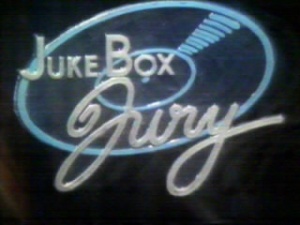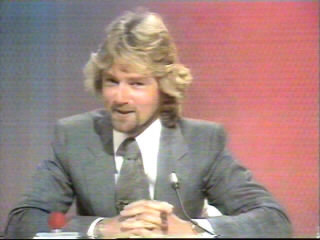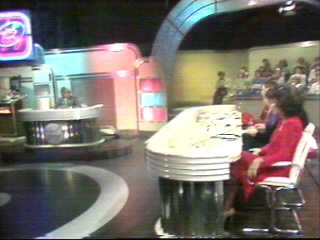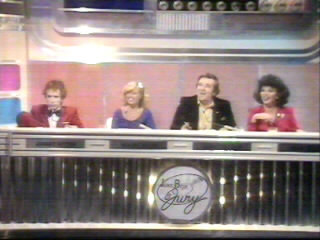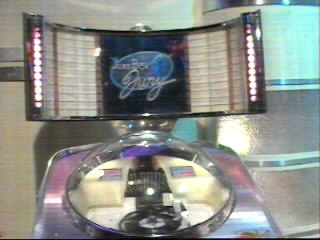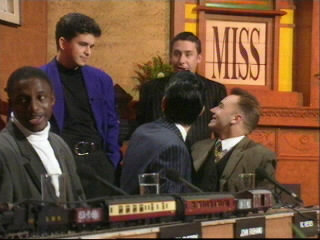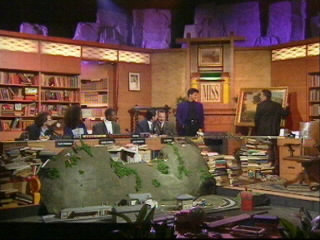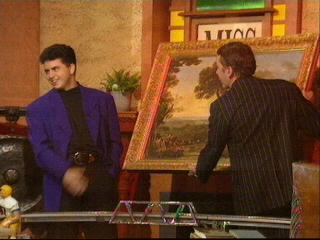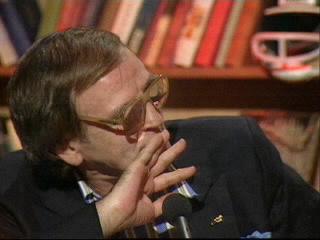Juke Box Jury
(→Web links) |
(add) |
||
| Line 44: | Line 44: | ||
And no, it ''didn't'' feature Janice "Oi'll give it foive" Nicholls. You'd be thinking of [[Thank Your Lucky Stars]] there. | And no, it ''didn't'' feature Janice "Oi'll give it foive" Nicholls. You'd be thinking of [[Thank Your Lucky Stars]] there. | ||
| + | |||
| + | == Key moments == | ||
| + | |||
| + | Glenn Medeiros' less than dignified response to having his "Nothing's Gonna Change My Love for You" follow-up voted a "Miss". | ||
| + | |||
| + | <div class="image">[[File:Jukeboxjury jools4.jpg]]''There'll be trouble.''</div> | ||
== Inventor == | == Inventor == | ||
| Line 74: | Line 80: | ||
<div class="image">[[File:Jukeboxjury jools3.jpg]]''It's a no from me.''</div> | <div class="image">[[File:Jukeboxjury jools3.jpg]]''It's a no from me.''</div> | ||
| - | |||
| - | |||
[[Category:Panel Game]] | [[Category:Panel Game]] | ||
Current revision as of 11:11, 25 August 2024
Contents |
Host
David Jacobs (1959-67)
Noel Edmonds (1979)
Jools Holland (1989-90)
Co-hosts
Vox pop interviews: Adrian John (1979)
Broadcast
BBC Television Service, 1 June 1959 to 27 December 1967 (431 episodes)
BBC1, 16 June to 18 August 1979 (9 episodes in 1 series)
BBC2, 24 September 1989 to 25 November 1990 (21 episodes in 2 series)
Synopsis
Famous panel game which reviewed the latest records that had been released that week - classics like Ol MacDonald by Frank Sinatra and Eeney Meeney Miney Mo by Pinky and Perky [ah, they don't make them like they used to - Ed]. The only prize on offer, if it could be described as that, is whether the record under review was a HIT or a MISS (with appropriate sound effect awarded too). If there was a 2-2 tie in the votes, the attention would then swing into the audience where three members of the public gave the casting vote by holding up records with HIT on one side and MISS on the other.
A running total of the number of Hits (ding!) and Misses (wrwrrwr!) was kept, as if that was some kind of MORI poll-style indication of the national taste in music. They got through about 7 or 8 songs in the half hour.
In the original series there was one DJ plus others from any area of showbiz plus "a typical teenager", the sum total was always being two men and two women. Later the entire panel tended to have a musical bent of some description.
One feature of the show was that one of the stars who they were talking about was actually behind the scenes and would be brought out afterwards. So if the panel really slagged off the record, they might have to explain themselves to the artist afterwards.
And no, it didn't feature Janice "Oi'll give it foive" Nicholls. You'd be thinking of Thank Your Lucky Stars there.
Key moments
Glenn Medeiros' less than dignified response to having his "Nothing's Gonna Change My Love for You" follow-up voted a "Miss".
Inventor
Peter Potter, who hosted the original US version of the show way back in 1948.
Theme music
Famously, "Hit Or Miss" by the John Barry Seven. According to Eddi Fiegel in her biography of Barry, the track replaced the show's original theme music (the specially-composed "Juke Box Fury" by Tony Osbourne) after being featured as a new release. Later editions of the original run featured a version by Ted Heath (the bandleader, not the former Prime Minister [well, duh - Ed.]). The 1989 revival used a cover version by Courtney Pine.
Trivia
On the 7th December 1963 edition, the guest panel were the Beatles. They would swap their name plates around on the front of their desks, and producer Cecil Korer tried but failed to get them back in the right order. They voted most records a MISS. On 4th July 1964, the Rolling Stones were on the show - unusual as that meant there were five panellists.
Probably the most controversial moment in the programme's history came on 7 January 1967 when one of the records under review was a psychedelic rock number about heroin addiction, "The Addicted Man" by a group called The Game. The record was slated by a panel of DJs, but the discussion never made it to air as the subject matter of the song led the BBC to cut the segment, meaning the show underran by seven minutes. Afterwards there was a lot of heated debate about whether the BBC was right to censor the show or not, and amid the controversy the record was withdrawn, though it has gone on to become regarded as something of a freakbeat classic.
The BBC programme notes for the 30th June 1979 edition read: "NB:Johnny ROTTEN smokes thru'out & drinks beer. Alan FREEMAN also smokes. FREEMAN & ROTTEN argue during review of The Monks record, & FREEMAN tells ROTTEN to shut up. ROTTEN walks out at end." The next week also notes: "Jonathan KING wears multi coloured wig thru'out programme." Marvellous.

